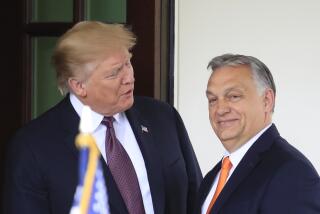The Week Ahead: ‘Troubles’ site hosts G-8, Obama’s ‘Yes we scan’

Northern Ireland venue for G-8 summit showcases recovery from ‘the Troubles’
Monday-Tuesday, June 17-18 -- Security is always a challenge at the annual Group of 8 summit, and this year host nation Britain has made the task particularly daunting with its choice of a Northern Ireland town synonymous with the violent era known as “the Troubles.”
President Obama and the other seven leaders of the rich-nation club will retreat to the serene Lough Erne golf resort on the outskirts of Enniskillen, scene of a 1987 bombing by Provisional Irish Republican Army militants that killed 11 and injured dozens.
British Prime Minister David Cameron and Northern Ireland provincial officials have touted the remote lakeside resort as a showcase of the recovery from that bloody, three-decade period when 3,600 died in the IRA struggle to wrest the province from British rule. The 1998 Good Friday agreement brought a tentative peace, but hundreds of republican dissidents are still thought to be biding their time on both sides of the border.
Always a magnet for anti-capitalist protest, the summit has drawn hundreds of would-be demonstrators to County Fermanagh, but many fewer than the Police Service of Northern Ireland had expected. More than 8,000 officers have been assigned to patrol the gathering, and miles of security fencing topped with concertina wire have been erected around the resort, the Irish Times reported Friday.
Despite the relative peace among the Irish, the G-8 leaders’ agenda will be focused on battlegrounds: Syria, trade disputes, tax dodgers and the plunder of Third World countries’ natural resources.
Russian President Vladimir Putin can expect to hear appeals that he push Syrian President Bashar Assad to negotiate with insurgents to end the civil war and appoint a new government. Obama and the European leaders also plan to press the Kremlin to cease weapons sales to Assad’s government.
The war in Syria, which the United Nations said last week had killed nearly 93,000 as of the end of April, has become increasingly sectarian and infiltrated by foreign militants on both sides. The Obama administration also reported last week that it had proof Assad’s forces used chemical weapons against the rebels in recent attacks, crossing what the president had said was a “red line” and spurring Washington to say it would provide the outgunned rebels with weapons and ammunition.
Obama planned to meet separately with Putin on the summit sidelines to work on the myriad troubles dogging relations between their countries. Congress this year passed the Magnitsky Act, barring Russian officials suspected of involvement in human rights abuses from entering the United States. Russian lawmakers retaliated with a bill banning U.S. adoption of Russian orphans after debates that spotlighted rare instances of abuse. And U.S. missile defense development remains a caustic subject with the Kremlin more than a quarter of a century after the Reagan administration announced its pursuit of a “Star Wars” missile shield.
U.S.-European trade negotiators poised for starting gun
Tuesday, June 18 -- Among the achievements to be announced after the G-8 summit is the intended start next month of negotiations on a mutually lucrative free trade agreement between the United States and the 27-nation European Union.
Both parties to the world’s most valuable trade relationship -- $1 trillion annually -- can count on massive benefits from the envisioned pact, according to a study commissioned by the Europeans. The boost in exports expected from dropping tariffs is forecast to bring in an additional $159 billion a year and 400,000 jobs for the EU, and the U.S. economy is expected to get a $127-billion annual infusion and a full percentage point of growth in gross domestic product.
The launch of the free-trade talks was in jeopardy as late as Friday, when the French minister for foreign trade insisted on a “cultural exception” that would allow individual countries to continue protecting and promoting their films and other subsidized entertainments.
All EU states represented at the preliminary talks in Luxembourg had expressed the intent to retain national control over cultural products, arguing that the EU’s multitude of languages and distinctive tastes put them at a disadvantage against the United States, where English-language films, books and other cultural output are more competitive exports to the rest of the world.
The United States had insisted that all trade spheres be on the table in working out the pact that both sides hope to conclude by the end of 2014. After a daylong standoff, the trade ministers compromised by temporarily excluding cultural wares from the trade negotiations mandate.
Though the compromise postpones rather than resolves the impasse, it should allow Obama and the European leaders at the Northern Ireland summit to proclaim victory in setting in motion removal of trade barriers between countries that account for half the global economy.
Wary Germans await Obama visit in wake of his ‘yes we scan’ revelations
Tuesday-Wednesday, June 18-19 -- Presidential candidate Barack Obama drew a wildly cheering crowd of 200,000 when he visited Berlin ahead of the 2008 election. His visit this week after the G-8 summit is likely to be tempered by German concerns about recent revelations that the U.S. government has been engaged in massive cyber-snooping.
Germans were buoyed by candidate Obama’s promises to end war-on-terror excesses and to restore the rule of law. They are disappointed with his failure to close the Guantanamo Bay, Cuba, detention facilities and alarmed by his expanded use of unmanned surveillance aircraft to locate and kill suspected terrorists.
Though Obama remains popular in Germany, the sweeping intelligence gathering revealed in recent weeks by a former CIA employee-turned-whistleblower has riled Germans who suffered from rampant privacy intrusions during the Nazi and East German communist dictatorships.
German Justice Minister Sabine Leutheusser-Schnarrenberger said Friday that officials had initiated questioning of European-based company representatives of Microsoft, Google, Facebook and other communications platforms to determine whether U.S. intelligence services have access to German user data.
The complaints won’t be one-sided, however, when Obama on Wednesday meets with German Chancellor Angela Merkel, architect and chief enforcer of the Eurozone austerity programs that have throttled economic growth on the Continent and contributed to record 12.2% unemployment. Because Europeans are vital trading partners with the United States, the economic flat-lining of the last five years has been a major factor in the slow U.S. recovery from the global recession.
Still, it will be Merkel with the most to gain or lose from the visit, as she and her conservative Christian Democratic Union face elections in September. After the U.S. domestic spying allegations were made by confessed classified information leaker Edward Snowden, Merkel’s spokesman told reporters in Berlin that she would seek assurances from Obama that U.S. intelligence programs weren’t violating the privacy of Germans on the other end of telephone calls, Web chats and email.
During Obama’s 2008 visit, Germans who had gathered around the Victory Column in Berlin’s Tiergarten to hear his speech chanted his campaign slogan, “Yes we can.”
In a sign of the changed mood in the wake of the surveillance scandal, European media have been lampooning the U.S. president’s defense of the domestic spying with a mock-up of Shepard Fairey’s rendition of Obama, sporting headphones under the slogan: “Yes we scan.”
More to Read
Sign up for Essential California
The most important California stories and recommendations in your inbox every morning.
You may occasionally receive promotional content from the Los Angeles Times.











